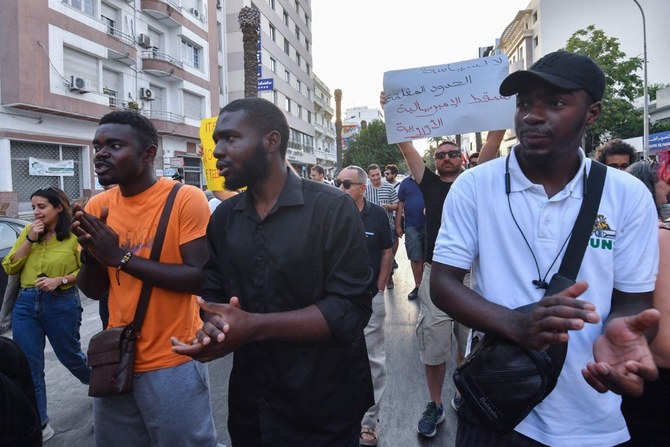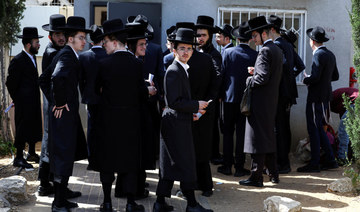TUNIS: Tunisian rights groups called on Friday for emergency aid and shelters for migrants expelled from Sfax last week, as dozens of people protested in Tunis in support of their plight.
Hundreds of migrants fled or were forced out of Tunisia’s second-largest city after racial tensions flared following the July 3 killing of a Tunisian man in an altercation between locals and migrants.
The port of Sfax is a departure point for many migrants from impoverished and violence-torn countries seeking a better life in Europe by making a perilous Mediterranean crossing, often in makeshift boats.
Hundreds of migrants were forcibly taken to desert and hostile areas bordering Libya and Algeria after the unrest in Sfax.
Romdane Ben Amor, spokesperson for the Tunisian Forum for Economic and Social Rights (FTDES), told reporters on Friday that between 100 and 150 migrants, including women and children, were still stuck on the border with Libya.
He said about 165 migrants abandoned near the border with Algeria had been picked up, without specifying by whom or where they were taken.
“Migrants are transferred from one place to another while other groups hide out in the wild in catastrophic conditions for fear of being detected and suffering the same fate as those stranded on the borders,” Ben Amor said.
He called for emergency accommodation to be given to the migrants and said the authorities must send “a clear message” to Tunisian citizens to help them, regardless of their status.
Around 100 protesters demonstrated Friday evening in Tunis at the call of an anti-fascist coalition, expressing their “solidarity with undocumented migrants.”
The demonstrators also slammed Tunisia’s police for “expelling you (migrants) and repressing us.”
“Tunisia is African. No to racism, down with fascism,” they chanted.
Meanwhile, the head of a Cameroonian association claimed police had carried out “arbitrary arrests” of sub-Saharan Africans around the train station in Zarzis, south of Sfax.
“Around 300 have been arrested... just because of their skin color,” said Eric Tchata, who posted online a video taken by a fellow Cameroonian purporting to show a group of people, including women and children, packed into a warehouse in Medenine, also south of Sfax.
Ben Amor expressed fears that migrants could die if they are not immediately given aid and shelter, noting that the bodies of two had already been found.
Human Rights Watch has said the migrants had been left to fend for themselves without water or shelter in the border regions, where temperatures surpass 40 degrees Celsius (104 Fahrenheit).
Tunisia saw a rise in racially motivated attacks after President Kais Saied in February accused “hordes” of migrants from sub-Saharan African countries of bringing violence, alleging a “criminal plot” to change the country’s demographic makeup.
The president’s remarks “gave people the green light to do what they liked to migrants,” said Naila Zoghlami, head of the Tunisian Association of Democratic Women.
Speaking to reporters alongside Ben Amor, she said women from sub-Saharan African countries have become more “vulnerable” since Saied’s remarks, with several saying they have been raped.
On Friday, Saied added that what Tunisia offered migrants “is better than what they find elsewhere.”
“But we refuse to be a land of transit or a land of settlement.”
He also doubled down on claims that Tunisia was a victim “of criminal networks of trafficking in human beings.”
Ben Amor dismissed Saied’s remarks, saying, “Expelling children and women is not a lesson in humanity” as the president had said.
Around 28 non-governmental organizations, both local and international, as well as trade unions and political parties also criticized Saied in a Friday statement.
His speech “spurred crime” and only served as a “blank cheque” for some to carry out “serious violence” against migrants, they said.
On Sunday, a high-ranking European delegation is due to visit Tunis to sign a deal stipulating financial aid for the North African country aimed at tackling illegal migration.
Tunisia rights groups urge aid, shelter for stranded migrants
https://arab.news/66qvb
Tunisia rights groups urge aid, shelter for stranded migrants

- Hundreds of migrants were forcibly taken to desert and hostile areas bordering Libya and Algeria after the unrest in Sfax
Egyptian, US foreign ministers discuss Gaza crisis

- During the call, Shoukry affirmed Egypt’s support for all efforts aimed at halting the Israeli war against the Gaza Strip and reaching an immediate and lasting ceasefire
CAIRO: Egypt’s Minister of Foreign Affairs Sameh Shoukry received a phone call from US Secretary of State Antony Blinken, during which they discussed the situation in Gaza.
During the call, Shoukry affirmed Egypt’s support for all efforts aimed at halting the Israeli war against the Gaza Strip, reaching an immediate and lasting ceasefire, swapping hostages and detainees, and ensuring full and unimpeded access of humanitarian aid to the Palestinian people.
Ahmed Abu Zeid, spokesperson at Egypt’s Ministry of Foreign Affairs, said the two sides tackled various facets of the ongoing humanitarian crisis in Gaza, including Shoukry’s emphasis on the inevitability of opening all land crossings between Israel and Gaza to bring in aid and provide safe conditions for the operation of international relief crews in the enclave.
They agreed to maintain consultation and close coordination to continue pushing toward a halt in the war and putting an end to the worsening humanitarian crisis in the Gaza Strip.
US President Joe Biden on Friday revealed a three-phase proposal for a ceasefire in the Gaza Strip proposed by Israel. Biden said the first phase of the proposed deal would last for six weeks, including a “full and complete ceasefire” and the withdrawal of Israeli forces from all populated areas of Gaza.
Egypt joins US and Qatar in calling on Israel and Hamas to finalize ceasefire agreement

- El-Sisi urges progress toward implementing a two-state solution
CAIRO: Egypt, Qatar and the US have jointly called on Hamas and Israel to finalize an agreement outlined by US President Joe Biden.
The joint press statement said: “As mediators in the ongoing discussions to secure a ceasefire in Gaza and the release of hostages and detainees, the United States, Egypt, and Qatar jointly call on both Hamas and Israel to finalize the agreement embodying the principles outlined by President Biden on May 31, 2024.”
These principles bring together the demands of all parties in a deal that serves numerous interests and will bring immediate relief to the long-suffering people of Gaza as well as the long-suffering hostages and their families. This deal offers a roadmap for a permanent ceasefire and an end to the crisis.
Biden on Friday revealed a three-phase proposal for a ceasefire in Gaza, saying it was “time for this war to end.”
The US president said the first phase of the proposed deal would last for six weeks and include a “full and complete ceasefire.”
In a separate context, on Saturday, Egypt’s President Abdel Fattah El-Sisi met with Lindsey Graham, Republican minority leader of the US Senate and ranking member of the Senate Appropriations Subcommittee on State and Foreign Operations.
Graham lauded Egypt’s fundamental role in reinforcing security and stability in the region, as well as the strategic partnership between Egypt and the US.
He said that successive regional and global crises have highlighted the need to further strengthen the partnership, because it is a key pillar of regional stability.
Graham pointed out Egypt’s efforts and mediation to contain the situation in Gaza and acknowledged the burdens Egypt endured to ensure the delivery of humanitarian aid into Gaza.
During the meeting, El-Sisi reiterated the importance of concerted international efforts to stop the war and prevent the expansion of its humanitarian and security repercussions.
He warned against the danger of the persistent and ongoing Israeli military operations in the Palestinian city of Rafah, the ensuing exacerbation of the humanitarian catastrophe suffered by the people of Gaza and the effect of the war on regional security.
El-Sisi also affirmed the necessity for all parties to engage seriously in efforts to reach a ceasefire agreement in a way that allows progress toward implementing the two-state solution, the optimal path to ensure justice and sustainable security in the region.
Israeli justices press government on religious conscription waivers

- The Supreme Court in 2018 voided a law waiving the call-up for ultra-Orthodox men who want to study in seminaries instead
- Ultra-Orthodox claim the right to study in seminaries instead of serving in uniform for the standard three years
JERUSALEM: The top Israeli court heard responses by the state on Sunday to challenges against exemptions granted to ultra-Orthodox Jews from military conscription, a long-standing source of friction with more secular citizens now inflamed by the long Gaza war.
In the name of equality, the Supreme Court in 2018 voided a law waiving the call-up for ultra-Orthodox men who want to study in seminaries instead. Parliament failed to come up with an alternative arrangement, and a government-ordered stay on a mandatory mobilization of ultra-Orthodox expired in March.
That has left Prime Minister Benjamin Netanyahu scrambling to agree with ultra-Orthodox coalition partners on a military service compromise that might preempt any Supreme Court ruling that Israel’s fasted-growing minority must be forcibly drafted.
“We’re not on quiet waters. We are at war, and the need (for military personnel) cries out,” one of nine justices hearing the case, Noam Solberg, told a government lawyer who argued that it was still too early for an ultra-Orthodox mass-conscription.
With fighting against Palestinian Hamas militants in Gaza and related violence on the Lebanese border exacting the highest troop casualties in decades, many Israelis resent their fellow citizens being spared their share of the risk.
The ultra-Orthodox claim the right to study in seminaries instead of serving in uniform for the standard three years. Some say their pious lifestyles would clash with military mores, while others voice ideological opposition to the liberal state.
The ultra-Orthodox make up 13 percent of Israel’s population, a figure expected to reach 19 percent by 2035 due to their high birth rates. Economists argue that the draft exemption keeps some of them unnecessarily in seminaries and out of the workforce.
The government’s lawyer, Doron Taubman, said it placed a high priority on increasing ultra-Orthodox enlistment.
“But it is also mindful of the enormous difficulty the community sees in the drafting of seminary students, both due to the cardinal fear of their lifestyle being compromised and the fear of Bible study being compromised,” he told the court.
It was not immediately clear when the court might rule in the case, whose first hearings took place in February.
Two Lebanese shepherds killed amid ongoing escalation along Lebanon-Israel border

- State news agency: The men were civilians who used to sell sheep milk to neighboring villages
- Clashes between Israeli forces and Hezbollah have escalated in recent weeks
BEIRUT: Two Lebanese shepherds were killed in an Israeli strike that hit their house in the town of Houla near the Lebanon-Israel border on Sunday, state media reported.
Lebanon’s National News agency said the men were civilians who used to sell sheep milk to neighboring villages.
Lebanese Agriculture Minister Abbas Hajj Hassan said in a statement that a separate Israeli strike Sunday morning had damaged his ministry’s office in the town of Bint Jbeil, as well as the city’s commercial market and local government headquarters.
Also Sunday, the Lebanese militant group Hezbollah claimed a drone attack on an Israeli military facility in the Golan Heights. It said the strike had hit a radar system for Israel’s Iron Dome air defense system, as well as forces operating it.
The Israeli military did not confirm damage to the radar system but said that two drones “were identified falling in open areas” and “as a result of one of them, a fire broke out adjacent to Katzrin in the Golan Heights and was extinguished shortly afterward.” It said no injuries were reported.
Clashes between Israeli forces and the Lebanese militant group Hezbollah, which have taken place near-daily since October, have escalated in recent weeks.
Israeli strikes have killed more than 400 people in Lebanon, most of them militants with Hezbollah and allied groups but also including more than 70 civilians. Strikes coming from Lebanon have killed at least 10 civilians and 15 soldiers in Israel.
Western countries, in particular the US and France, have come forward with a series of proposals for a cessation of hostilities on the Lebanon-Israel border. Hezbollah has refused to enter into an agreement until a ceasefire is implemented in Gaza.
Profile of new Kuwaiti crown prince Sheikh Sabah Khaled Al-Sabah

- On November 2019, the emir signed an order appointing Sheikh Sabah Khaled as Prime Minister
The Emir of Kuwait, Sheikh Meshal Al-Ahmad Al-Jaber Al-Sabah signed an order on Saturday nominating Sheikh Sabah Khaled Al-Hamad Al-Sabah as Crown Prince.
Born in 1953, Sheikh Sabah Khaled obtained a bachelor’s degree in Political Science from Kuwait University in 1977. He joined the Ministry of Foreign Affairs in 1978 as a diplomatic attaché, serving in the Arab Affairs Department from 1978-1983, and later joined Kuwait's Permanent Mission at the UN from 1982-1989.
Sheikh Sabah Khaled served as Kuwait's Ambassador to Saudi Arabia and Permanent Representative to the Organization of Islamic Cooperation from 1995-1998, participating in GCC ministerial meetings during this period. He was appointed head of the Kuwait National Security Bureau at the rank of minister in 1998.
He was named Minister of Social Affairs and Labor in July 2006 and in March 2007, and served as Information Minister between May 2008 and January 2009. Sheikh Sabah Khaled was appointed Minister of Foreign Affairs in 2011 and later named Deputy Prime Minister, Minister of Foreign Affairs, and Minister of State for Cabinet Affairs in February 2012.
In December 2012, he was named Prime Deputy Minister and Foreign Minister. In January 2014, Sheikh Sabah Khaled was named First Deputy Prime Minister and Foreign Minister, retaining the post in December 2016 and again in December 2017.
On November 2019, the emir signed an order appointing Sheikh Sabah Khaled as Prime Minister and another order to address him as Sheikh Sabah Khaled Al-Hamad Al-Sabah. On December 14, 2020, Kuwait's late emir Sheikh Nawaf Al-Ahmad Al-Jaber Al-Sabah assigned Sheikh Sabah Khaled to form his second government and assigned him to form his third government on March 2, 2021. The late emir accepted Sheikh Sabah Khaled's resignation on November 18, 2021. The late emir then signed a decree assigning Sheikh Sabah Khaled to form the country's 39th government and his fourth.
Sheikh Sabah Khaled has received several prestigious awards: Saudi Arabia's late King Fahad awarded him the King Abdulaziz Order of the first class in 1998; former Sudanese President Omar Al-Bashir awarded him the Two Niles Order in 2012; Senegalese President Macky Sall awarded him the National Order of the Lion in 2015; and Palestinian President Mahmoud Abbas awarded him the Al-Quds Star Order in 2018.


















